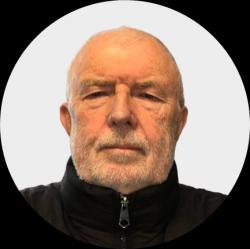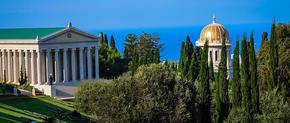The views expressed in our content reflect individual perspectives and do not represent the authoritative views of the Baha'i Faith.
Who would you long to be with for eternity in the next world? A spouse, partner, family, or friends – or Rumi, perhaps?
This is how I would die
into the love I have for you
As pieces of cloud
dissolve in sunlight. – Rumi
Would you choose Socrates, Shakespeare or a beloved grandmother perhaps, who taught you about being, truth, goodness, beauty, and justice?
All people want the closeness and intimacy our hearts desire. At the heart-center of all of our longings is the longing for “at-one-ment” – atonement. Happiness and fulfilment rest in “being at-one.” The deep mystical reality is to be at-one with the unknowable mystery of the Whole. For some, the Creator is ultimate, never knowable, the “ground of all being.” For others God is a personal God.
Considering this summit of at-one-ment strengthens our ability to be at-one with closer levels of relationship, such as with our partner, our family, our friends – and with all people. At the summit, no matter what path you take to reach it, you will find oneness, as encouraged in this passage from the writings of Abdu’l-Baha:
… we, all of us, should strive with our whole hearts to offer ourselves up, guide others to His path, and train the souls of men – until these frenzied beasts change to gazelles in the meadows of oneness, and these wolves to lambs of God, and these brutish creatures to angelic hosts; till the fires of hatred are quenched, and the flame coming out of the sheltered vale of the Holy Shrine doth shed its splendours; till the foul odour of the tyrant’s dunghill is blown away, and yieldeth to the pure, sweet scents that stream from the rosebeds of faith and trust.
All of the spiritual paths reviewed in this series of articles – Hinduism, Taoism, Buddhism, Judaism, Christianity, Islam, and in this essay the Baha’i Faith – offer experiential ways that can take us there. The steps are sequenced differently depending on the make-up and personal history of each individual, but as the French philosopher Pierre Teilhard de Chardin noted, “Everything that rises must converge.”
RELATED: Breaking Bread and Creating Interfaith Bonds
The Flow of the Spirit
Like water, spirit flows unless temporarily blocked. We witness spirit forming and transforming, in the world, in others, and most importantly in ourselves. The human spirit, the reality behind our consciousness, can recognize spiritual truth, just as a well-trained mind recognizes intellectual truth. The Baha’i teachings express this deep truth – that in the great religions the eternal, real, mystical teachings are overwhelmingly one.
In his Most Holy Book, Baha’u’llah wrote “This is the changeless Faith of God, eternal in the past, eternal in the future.”
When we have spiritual self-knowledge we recognize those teachings as our own heart-center.
In a nutshell, the Baha’i theology is very simple: there is one God, one Holy Spirit, and just one human family, educated by an unending series of divine prophets and messengers. These manifestations of God – Abraham, Moses, Krishna, Buddha, Christ, Muhammad, and most recently Baha’u’llah – are perfect mirrors reflecting the love and light of God.
Through our life-experiences attempting to reach the spiritual summit of full consciousness, we suddenly, or gradually, realize the two realms of the ‘dual-nondual worldview.’ The first is the contingent realm, including the material world. The second is the realm of spirit – a step out of self and into the presence of God. Ultimately the two are one.
When we come to that realization, we create a passport as citizens of both realms. As we learn appropriate practices, meditation, prayer, study, and service to others, we learn to step out of the time-bound world into the eternal now, which is space-less and mass-less as well as timeless. In that space, we realize that broadly there are two kinds of knowing: first, the practical and the theoretical, what we learn from our lived experience and our intellect; and second, what we called gnostic knowing – the gifts of God. Gnosis signifies a spiritual knowledge or insight into humanity’s real nature as divine.
Metaphorically, we each have our own island of knowledge – a speck in an infinite ocean. On that island we cultivate such knowledge that enables us to survive and function in the dual world. On the island shoreline facing out to the infinite ocean of knowledge, we, as Heschel says, are where “only the sense of the ineffable can glide.” When we gaze across that deep ocean, we suddenly or gradually understand that all is God.
As a true spiritual seeker looks over and into that ocean, he learns to “read the book of his own self” as Baha’u’llah wrote in the Seven Valleys.
This self-learning lights the way to the summit of oneness, where “We can see more clearly now, and now, and now, as we oscillate between the two worlds.”

















Comments
Sign in or create an account
Continue with Facebookor